Note- this is a plot summary for this nearly century old, largely culturally irrelevant movie for context, not analysis. The analysis will begin after this paragraph:
You may not have heard of Wings, the 1927 silent, first best picture Oscar-winning film, but you have seen it before. Jack, an all-American boy, pines for aviation and dignified city-girl Sylvia. Slyvia’s kindness makes her reticent to break Jack’s heart; she really loves David Armstrong, and equally kind rich boy. When World War I calls and both answer, Jack asks for and receives Sylvia’s picture, unbeknownst to him, that professes love to David on the back. Both boys become friends at training camp, and the friendship soars like their careers as star fighter pilots. The friendship eventually again strains when David destroys the picture to prevent Jack from finding out the truth. In the next battle, David overexerts himself and is shot down trying to prove friendship despite Jack’s anger. David survives, and commandeers a German plane to fly back. Jack sees this German plane and shoots it down to avenge his loss. After landing, Jack realizes the flier was David, and they forgive, caress, and kiss as David dies. Later realizing his foolishness towards Sylvia, Jack returns home a hero, ending the film romantically involved with his neighbor.
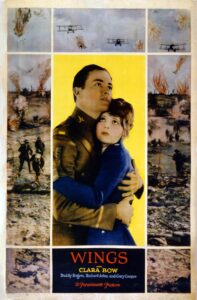
So, who is this random neighbor?
She, Mary Preston, played by top-billed megastar Clara Bow, only receives about a tenth of the overall screentime, despite appearing on all the posters. Her scenes are relatively disconnected from the plot; though Sylvia appears for five minutes, her existence causes tension in the main war plot. Mary causes no such tension, and Jack’s first words to her of “Gee, can’t you let a man work in peace?” encapsulate their relationship (Wings, 00:03:26) But though Slyvia affects the war plot more directly, Mary commands her own rom-com subplot to win Jack’s love. When Mary appears on screen, all the other themes of brotherhood(?) and war are forgotten, essentially creating a fusion of a war and rom-com movie, with Mary as the clear lead in the latter. This does not make Wings an “empowering movie,” for a closer look at the genres themselves a deference to prevailing social structures, allowing both to cohere and “come home” in a socially acceptable manner- a heterosexual relationship.
From the opening, Mary’s active pluck sets up a familiar binary with Sylvia. Sylvia literally swings onto the frame with David, sitting, and playing music (Wings, 00:06:48). Mary, after upturning her lacy undergarments on the drying line- creating a more risqué association reinforced by a later scene of her changing topless, even if the character herself is not sexual- to get a better look at Jack, and the climbs a high fence to be next to him (Wings, 00:02:59).
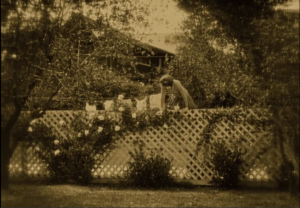
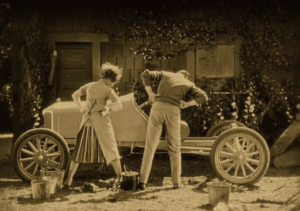
Despite his rebuffs, she puts an apron on to help fix Jack fix his car (Wings, 00:04:09). Though Sylvia has her music, Mary can drive a car, and these driving skills land her in the women’s Motor Corps (Wings, 00:26:20). Slyvia dresses as an older ideal of women with her elaborate curls and ever-present lacy long dresses, whereas Mary’s flapper bob, risqué associations, and later smart uniform indicate she belongs to a newer era.
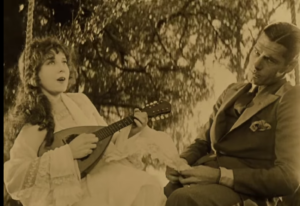
Though modern, she has a sensitive heart. When Jack drinks himself to incapacity and dallies with duplicitous women on shore leave, too drunk to realize he must report back- or else, court-martial, Mary must save his career (Wings, 01:07:50)! The scene follows Mary’s point of view, taking long shots of her despair as her attempts at reason don’t work, at one point doused with champagne (Wings, 01:12:59).
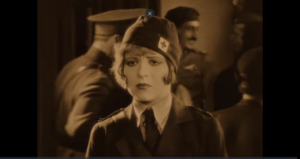
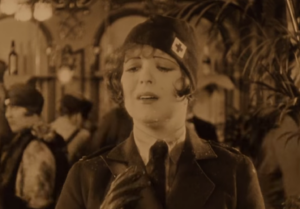
But through a random kindly old French woman’s intervention of a glamourous dress, Mary uses her revealed sexiness to save Jack (01:13:50-01:18:00). Unfortunately, after putting him to bed, officers barge into the room while she changes. Assuming her waywardness, Mary tearfully but willingly resigns from the military, and the top-billed character does not return for another hour (01:24:00). Mary expresses her femininity in different ways that Sylvia- sexuality, action, and skills- but she remains a girl in all the ways that matter- obeying authority and standing by “her” man despite his lack.
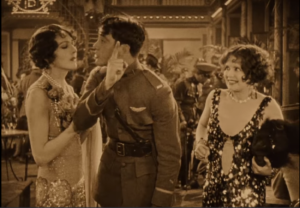
In Wings, two plotlines exist. The war plot follows the false love triangle of jealousy and brotherhood(?) that culminates in patriotic tragedy, and other involves our zany rom-com top-billed heroine desperately trying to get the protagonist, and thus implicitly the movie, to notice her. For her efforts, despite Jack not remembering her Paris sacrifice, she gets her desired relationship. Mary also joins the chorus of characters at the end assuring Jack that he shares no guilt in David’s death, which includes David and David’s parents- it’s simply the war’s fault (02:06:34-02:17:28). Instead of focusing on the actions of men that comprise the war, responsibility is taken away from Jack so the prevailing social structure and the type of men they produce needs no critiquing. Jack is a hero. End of story. Heroes must get a girl. Rom-Com Heroines must get their man, no matter how terrible they may be. End of story. Though both Mary and Jack lead different genre plotlines, both the patriotic war movie and the rom-com encourage adherence to the status quo. Mary never questions why she loves Jack at any point. Despite Jack’s dismissiveness towards Mary and deadly jealousy toward David, he gets to go home- by virtue of his “heroism.” By virtue of Mary’s rom-com plotline, she gets her man in the end, despite his previous lack of interest. In the end, there are no possibilities, whether that be more romantic interpretations of Jack and David, or Mary alternatively using her independence and can-do attitude to do literally anything else.
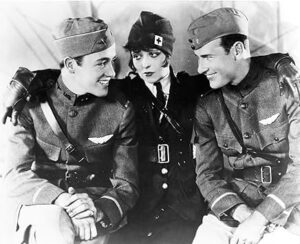
Works Cited:
Wings. Directed by William A. Wellman, Paramount Famous Lasky Corporation, 1927.
Poster and photoshoot taken from: https://www.imdb.com/title/tt0018578/mediaindex/?ref_=tt_mv_close
I completely forgot about this movie! I’ve never seen it in full, but that scene of Jack holding David while he dies is iconic and infamous. I just rewatched it to familiarize myself and wow, there is so much to be said about the homoeroticism of war (especially WWI). This is a really fascinating analysis about how Mary’s character negates all the “brotherhood” throughout the movie, reassuring the audience that movies like this can only end one way—the hero comes home and marries a woman who loves him. For him to have a lasting intimate bond with a man is unthinkable, and so David has to die, because otherwise they would’ve com out of the war caring about each other more than anything else (including Sylvia).